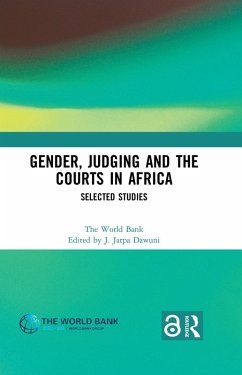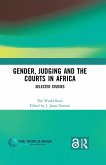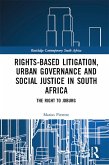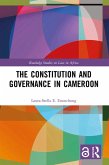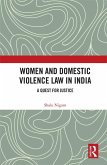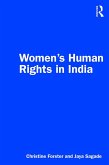Women judges are playing increasingly prominent roles in many African judiciaries, yet there remains very little comparative research on the subject. Drawing on extensive cross-national data and theoretical and empirical analysis, this book provides a timely and broad-ranging assessment of gender and judging in African judiciaries.
Employing different theoretical approaches, the book investigates how women have fared within domestic African judiciaries as both actors and litigants. It explores how women negotiate multiple hierarchies to access the judiciary, and how gender-related issues are handled in courts. The chapters in the book provide policy, theoretical and practical prescriptions to the challenges identified, and offer recommendations for the future directions of gender and judging in the post-COVID-19 era, including the role of technology, artificial intelligence, social media, and institutional transformations that can help promote women's rights.
Bringing together specific cases from Kenya, Uganda, Ghana, Nigeria, Zambia, Tanzania, and South Africa and regional bodies such as ECOWAS and the African Commission on Human and Peoples' Rights, and covering a broad range of thematic reflections, this book will be of interest to scholars, students, and practitioners of African law, judicial politics, judicial training, and gender studies. It will also be useful to bilateral and multilateral donor institutions financing gender-sensitive judicial reform programs, particularly in Africa.
The Open Access version of this book, available at
www.taylorfrancis.com/books/oa-edit/10.4324/9780429327865/gender-judging-courts-africa-jarpa-dawuni, has been made available under a Creative Commons Attribution-Non Commercial-No Derivatives 4.0 license.
Employing different theoretical approaches, the book investigates how women have fared within domestic African judiciaries as both actors and litigants. It explores how women negotiate multiple hierarchies to access the judiciary, and how gender-related issues are handled in courts. The chapters in the book provide policy, theoretical and practical prescriptions to the challenges identified, and offer recommendations for the future directions of gender and judging in the post-COVID-19 era, including the role of technology, artificial intelligence, social media, and institutional transformations that can help promote women's rights.
Bringing together specific cases from Kenya, Uganda, Ghana, Nigeria, Zambia, Tanzania, and South Africa and regional bodies such as ECOWAS and the African Commission on Human and Peoples' Rights, and covering a broad range of thematic reflections, this book will be of interest to scholars, students, and practitioners of African law, judicial politics, judicial training, and gender studies. It will also be useful to bilateral and multilateral donor institutions financing gender-sensitive judicial reform programs, particularly in Africa.
The Open Access version of this book, available at
www.taylorfrancis.com/books/oa-edit/10.4324/9780429327865/gender-judging-courts-africa-jarpa-dawuni, has been made available under a Creative Commons Attribution-Non Commercial-No Derivatives 4.0 license.
Dieser Download kann aus rechtlichen Gründen nur mit Rechnungsadresse in A, B, BG, CY, CZ, D, DK, EW, E, FIN, F, GR, HR, H, IRL, I, LT, L, LR, M, NL, PL, P, R, S, SLO, SK ausgeliefert werden.

